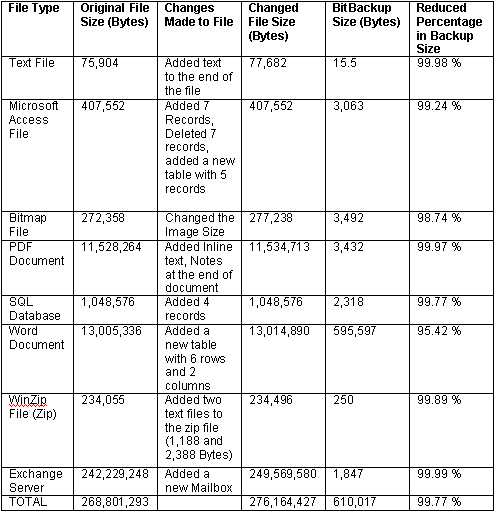
BitBackup technology can do backups and restores many times faster than traditional methods while using far less storage space on the RBS Server by backing up only the small parts of files that have changed since the last full backup. It's local Data Store insures that multiple copies of the most recent backup files are maintained for added safety and failsafe operation.
BitBackup results in a reduction in backup size by an average of 99.77%
BitBackup's Local Data Store
BitBackupmaintains copies of the most recent versions of the files it backs up to the RBS Server in a local Data Store. Restoring from the local Data Store is automatic and VERY fast - the speed of the local Network or disk buss. The most common restores are done from the local Data Store instead of from the RBS Server.
BitBackup is far more reliable and failsafe than traditional online backup methods. It's local Data Store acts as a "hot spare" for backups, mirrored to the RBS Server. Restores are done first from the local Data Store, and fail over to the RBS Server only if the requested files are not available in the local Data Store.
Restores done from the local Data Store do not contact the RBS Server at all, and do not require an Internet connection. Therefore, in an emergency that takes the RBS Server offline, or brings down the Client's Internet connection, restores from the local Data Store can still be done.
The local Data Store can be maintained on each local computer, or it can be shared by all computers in a network on a network device.
Backups with BitBackup
The first time a file is backed up using BitBackup technology, the entire file is backed up to the RBS Server, and a snapshot of the file is stored in the local Data Store.
Subsequent BitBackups of the same file compare the most current "live" version of the file to the snapshot stored in the local Data Store. Copies of the changes between the two files (called Patches) are created and backed up to the RBS Server.
Since these Patches contain only the changes made to the "live" file since the Reference File was made, they are often very small - just a few words or a paragraph out of a large document.
Patches are cumulative. Every patch has the ability to restore a file from the date of the most current Reference copy to the date of the Patch. Thus, BitBackup technology needs only one patch and one Reference copy to restore a file to any point in time.
Since Patches are cumulative, they tend to grow larger with time. At some point in time a Patch may approach the size of the original file, if that file is modified frequently. When that happens, BitBackup technology refreshes the Reference file in the local Data Store and on the RBS Server through a process called Roll-Forward. This reduces the size of the Patches to their minimum size again.
Thresholds for Roll-Forward can be set in two ways - by number of backups since the most recent full-file backup, or by the size of the Patch relative to the Reference file. When one of these thresholds is reached, BitBackup technology performs another full-file backup and (depending on the Purge/Retention Settings) erases the previous full-file backup, all its Patches, and the older Reference copy stored in the local Data Store.
BitBackup's Roll-Forward procedure is fully compliant with all the Purge/Retention Settings that are used with Incremental, Differential, and Full backup methods.
Restoring Files with BitBackup
From a user's perspective, restoring files with BitBackup works the same way as the other backup methods, only much faster. From a technical perspective, however, it is quite different.
BitBackup first determines which files are needed to restore a full file by determining the Patch file needed to restore the selected version. It then looks up the Patch file and its associated Reference file in the local Data Store.
If both the Reference file and the Patch exist in the local Data Store, BitBackup restores them from the local Data Store without downloading them from the RBS Server. If they are not the correct versions (or they don't exist in the local Data Store), BitBackup downloads the correct versions from the RBS Server.
If the correct version of the Reference file exists in the local Data Store, but the correct version of the Patch does not, BitBackup downloads only the Patch from the RBS Server.
BitBackup then applies the Patch to the Reference file, converting it to a full file of the selected version, and copies it into its original location, or an alternate location if selected.
BitBackup Efficiency
The following table illustrates some typical file types and the tested percentage of file size reduction using BitBackup. Your actual results may vary, depending on many factors including the type of data stored, the number and size of changes applied, various user-controlled settings in the software, pre-backup file processing by applications out of RBackup's control, and the methods used by application software to modify the target files.
Because there are so many variables that can affect the size of BitBackup backups, RBS cannot guarantee that you will achieve these results.
